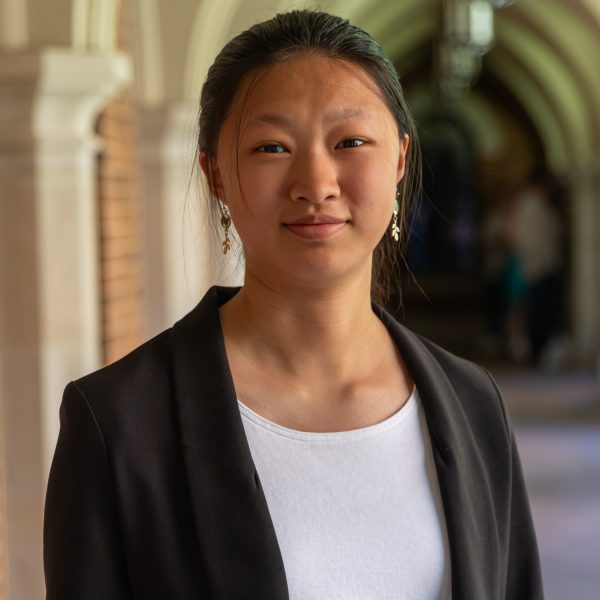Assistant Professor of English Akshya Saxena and Assistant Professor of the Practice in Italian Elsa Filosa received, respectively, the Modern Language Association (MLA) Prize for a First Book and an honorable mention for the MLA Scaglione Prize for Italian Studies for their works published in 2022.
The MLA Prize for a First Book is awarded to a professor who published their first book-length publication, including a literary or linguistic study, a critical edition of an important work or a critical biography. The Aldo and Jeanne Scaglione Prize for Italian Studies is awarded biennially for an outstanding book by an author of Italian literature or comparative literature involving Italian.
Inspiration for works
Saxena won the MLA Prize for a First Book for “Vernacular English: Reading the Anglophone in Postcolonial India,” which explores the role of English in combating the remnants of British colonial power. She used three studies of the English language and culture in India to illustrate her findings, culminating in the thesis that the language was not a product of imperial coercion but one that the people of India reclaimed for their own.
Saxena attributed the inspiration for “Vernacular English” to her experience as a college student in India studying English literature. She observed differences between how she studied English in the classroom as a colonial language and how it was used outside of school.
“I would see my grandmother, who didn’t know a word of English, reading English words in the Hindi-language newspaper we got at home,” Saxena said. “Observing her read English like this made me wonder about the limits of a language. That’s where the project began, but it soon became a book about what we think of when we think about English. What becomes intelligible as the English language, and how does English become intelligible?”
The goal of “Vernacular English,” according to Saxena, is to tackle how society tells the story of the English language. She examined English through “India’s multilingual local milieu,” focusing on how various people across caste, class and racial divides claim the language differently.
Filosa received an honorable mention for the MLA Scaglione Prize for Italian Studies for her book “Boccaccio’s Florence: Politics and People in His Life and Work.” This work details the financial and social issues in Florence in the fourteenth century, as well as literary and political figures that may have emerged in writer Giovanni Boccaccio’s writings at this time. Filosa’s book examines the Florentine conspiracy of 1360 and how it affected Boccaccio’s writings, who focused on the politics of Florence.
Filosa attended the University of Milan in Italy for her undergraduate years. While studying, she read many of Boccaccio’s works, including passages from the “Decameron” and the “Corbaccio,” which she enjoyed immensely. She explained that she continued to study his work due to an internal drive to “know” Boccaccio better as a person “living in a historical context.”
In 2015, Filosa won the Villa I Tatti Fellowship, which allowed her to live in Florence for one year, where she got to research Boccaccio and his works further.
“The experience of digging in archival material every day, while living in the valley of the river Mensola, where Boccaccio grew up as a little boy, has been an extraordinary experience, surely one of the best of my life,” Filosa said.
Gratitude for others
Upon reflecting on her accomplishment, Saxena credited Vanderbilt’s English department for offering her “an intellectually generous and exciting environment.” She said the research of her colleagues, which focuses on global literature throughout history, has allowed her to take on projects like “Vernacular English” and examine what English literature means in a historical context.
Saxena also wants to push conversations about linguistic diversity into all spaces on campus and encourage broader discussion.
“Vanderbilt has a vibrant multilingual community that reflects the diversity of the United States and the world. I would love for us to harness this strength as much as possible in our classrooms and through an inclusive campus culture,” Saxena said. “In a polarized world marked by the racialization of differences, celebrating our often-unacknowledged multilingualism can destabilize the U.S. American classroom as a monolingual English-speaking space.”
Filosa credited her colleagues in the Department of French and Italian, the chairs of the department and several Vanderbilt history professors who aided her throughout the process.
“Vanderbilt University has been key for funding research…and helping me to cover the expenses for professional copyediting,” Filosa said. “I am not a native speaker of English, and writing a book in a foreign language was undoubtedly challenging.”
Future plans
Saxena is currently writing her second book, “Linguistic Utopias: Infrastructures of the Future in the Global South,” which questions how society shapes specific words people use in various languages. The book will examine how technology changes how people communicate and interact with others, specifically in Hindi and English literature throughout South Asia and Anglophone Africa.
“While the book is directed toward scholars of literature, I hope the book will interest anyone who wants to learn about language and power, especially the global life of English language and Literature,” Saxena said.
Through her research, Filosa discovered similarities between the Florentine politics of the 1300s and today, including how actively engaged people wanted to be in politics at the time.
“Maybe today, many of us forget that politics is made by every single citizen, and we should be actively invested in the governance of the Republic,” Filosa said. “In the Florentine historical period I have studied, people just do not passively experience injustice, they were actively fighting against injustice. Once again, something we should continue to do today.”




